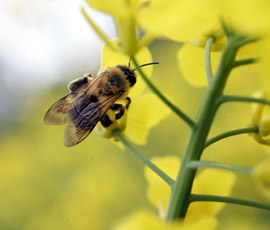Scots government urges delay on neonicotinoid ban

Scotland’s rural affairs secretary has called on the EU to delay plans for a ban on pesticides considered harmful to bees.
Crucial proposals to suspend the use of three neonicotinoid insecticides amid claims they are damaging bee populations are again set to be voted on by EU member states in Brussels today (Monday 29 April), after an inconclusive vote last month.
Richard Lochhead has written to DEFRA ministers urging them to accept the restrictions on the use of neonicotinoids.
Europe should opt to restrict the use of neonicotinoids by 2015 providing a breathing space to allow evidence gathering between now and then to prove or disprove they are harmful to bees, he said.
But any restrictions should not be implemented until further evidence is gathered, he added.
If the research proves the pesticides are not harmful to bees, the EU proposal to ban them should then be withdrawn, Mr Lochhead said.
France, Germany, Italy and Slovenia have already banned the use of neonicotinoids.In the absence of conclusive scientific evidence, Mr Lochhead said he believed it was right that Europe proved neonicotinoids were harmful to bees before any ban is implemented.
“The Scottish government takes the health of bees and other insect pollinators very seriously but, in this case, the science has not been clear-cut,” he said.
“Ministers have to therefore make careful judgements in the absence of conclusive evidence. I recognise that this is a highly sensitive and emotive subject. It is, therefore, disappointing that the results from the bumble bee field trials were inconclusive.”
He added: “When it comes to protecting our biodiversity and wildlife, there are times when taking a precautionary approach is perfectly justifiable.
“It is in the interests of our environment and our farmers that we have healthy bee populations, but we know there are a wide range of factors affecting these valuable pollinators.”
Mr Lochhead said two years’ breathing space would allow any existing stocks to be used and also time to ensure that any alternatives on the market do not make matters worse.
“I do not think that year after year of debate over what the science tells us will get us very far or help our bee populations or farmers,” he added.
“That’s why I am suggesting a precautionary approach with a built-in breathing space and exit strategy.”
But SNP member of the European Parliament’s agriculture committee Alyn Smith MEP said there was a “clear case” to answer on neonicotinoids, adding “we need to act now”.
“Scotland is represented in these talks by the UK government, and it is simply not good enough that the UK has abstained in previous votes – it’s time to pick a side,” he said.
“The commission’s proposed partial ban is I think proportionate and workable, and based on the best independent science available as opposed to industry lobbying.
“There is clear and credible evidence that neonicotinoids have a detrimental effect on pollinators, and the consequences of inaction are potentially catastrophic. By all means let us research this further, but this should not be used as an excuse for inaction.”
Over the weekend, reports emerged that some member states, including the UK and Germany, may be set to revise their position and vote to reject the proposed ban in the council’s appeal committee.
However, the European Commission could decide to step in and enforce a ban if a second vote ends in a stalemate.
On Friday (26 April) fashion designers Dame Vivienne Westwood and Katharine Hamnett handed a petition of 300,000 signatures to Downing Street, urging the government to back a two-year ban.
But DEFRA secretary Owen Paterson, supported by the NFU, is adamant there is not enough evidence to support a ban, which could cost farmers in the UK an estimated £630m a year in lost revenue.
A DEFRA spokeswoman said: “As the proposal currently stands we could not support an outright ban.
“We have always been clear that a healthy bee population is our top priority – that’s why decisions need to be taken using the best possible scientific evidence and we want to work with the commission to achieve this.”

